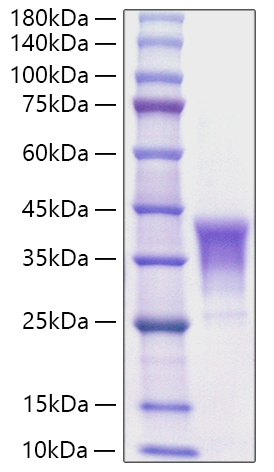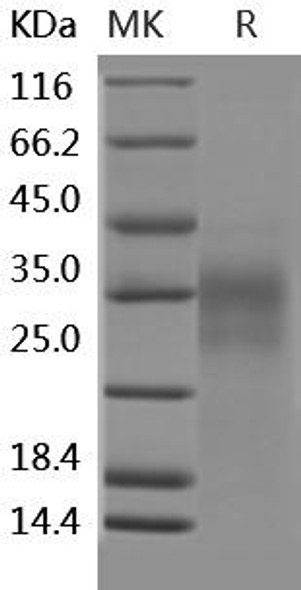Recombinant Human TNFSF8/CD30 Ligand/CD153 Protein (RPCB1207)
- SKU:
- RPCB1207
- Size:
- 10µg
- Tag:
- N-His
- Reactivity:
- Human
- Expression Host:
- HEK293 cells
Description
| Product Name: | Recombinant Human TNFSF8/CD30 Ligand/CD153 Protein |
| SKU: | RPCB1207 |
| Size: | 10µg |
| Tag: | N-His |
| Reactivity: | Human |
| Expression Host: | HEK293 cells |
| Protein Description: | High quality, high purity and low endotoxin recombinant Recombinant Human TNFSF8/CD30 Ligand/CD153 Protein , tested reactivity in HEK293 cells and has been validated in SDS-PAGE.100% guaranteed. |
| Endotoxin: | < 0.1 EU/μg |
| Purity: | > 92% by SDS-PAGE. |
| Formulation: | Lyophilized from a 0.22 μm filtered solution of PBS, pH 7.4. |
| Gene ID: | 944 |
CD30 ligand (CD30L), also known as CD153 and TNFSF8, is a membrane-associated glycoprotein belonging to the TNF superfamily and TNFR superfamily, and is a specific ligand for CD30/TNFRSF8 originally described as a cell surface antigen and a marker for Hodgkin lymphoma and related hematologic malignancies. CD30L is a type-II membrane glycoprotein expressed on activated T cells, stimulated monocyte-macrophages, granulocytes, eosinophils, and some Burkitt-like lymphoma cell lines. CD30L is capable of transducing signals through CD30 on different CD30+ lymphoma cell lines, and mediates pleiotropic biologic effects including cell proliferation, activation, differentiation, as well as cell death by apoptosis. CD30-CD30 ligand interaction has been suggested to have a pathophysiologic role in malignant lymphomas, particularly Hodgkin disease, large cell anaplastic lymphomas and Burkitt lymphomas, and is also involved in activation and functioning of the T cell-dependent immune response. Thus, CD153 and its receptor CD30 are regarded as therapeutic targets in hematologic malignancies, autoimmune and inflammatory diseases.
| Storage: | Store at -20℃.Store the lyophilized protein at -20℃ to -80 ℃ up to 1 year from the date of receipt.After reconstitution, the protein solution is stable at -20℃ for 3 months, at 2-8℃ for up to 1 week. |
| Reconstitution: | Centrifuge the vial before opening. Reconstitute to a concentration of 0.1-0.5 mg/mL in sterile distilled water. Avoid vortex or vigorously pipetting the protein. For long term storage, it is recommended to add a carrier protein or stablizer (e.g. 0.1% BSA, 5% HSA, 10% FBS or 5% Trehalose), and aliquot the reconstituted protein solution to minimize free-thaw cycles. |
| Swiss-Prot: | P32971 |







